liver support
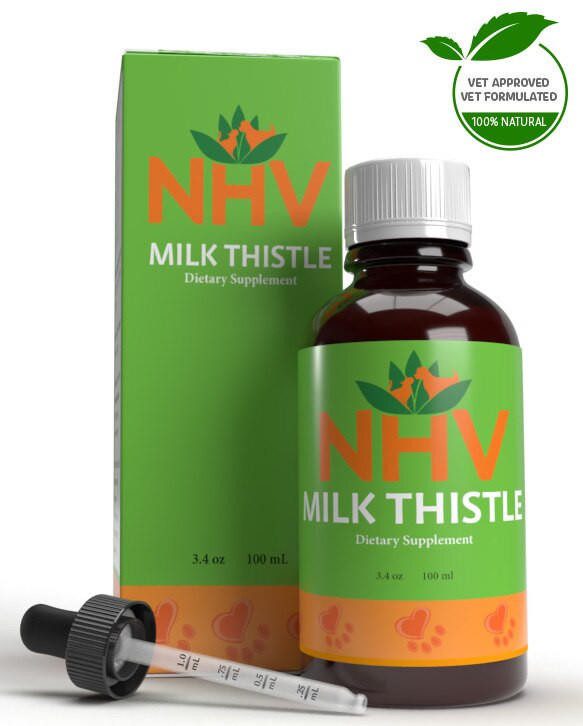
free shipping over $100 (USA & Canada)
1-877-937-4372 the pet expert hotline
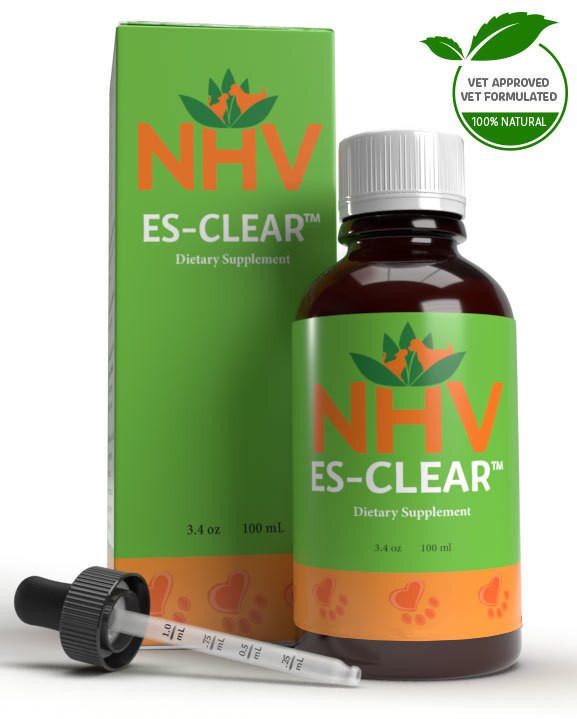
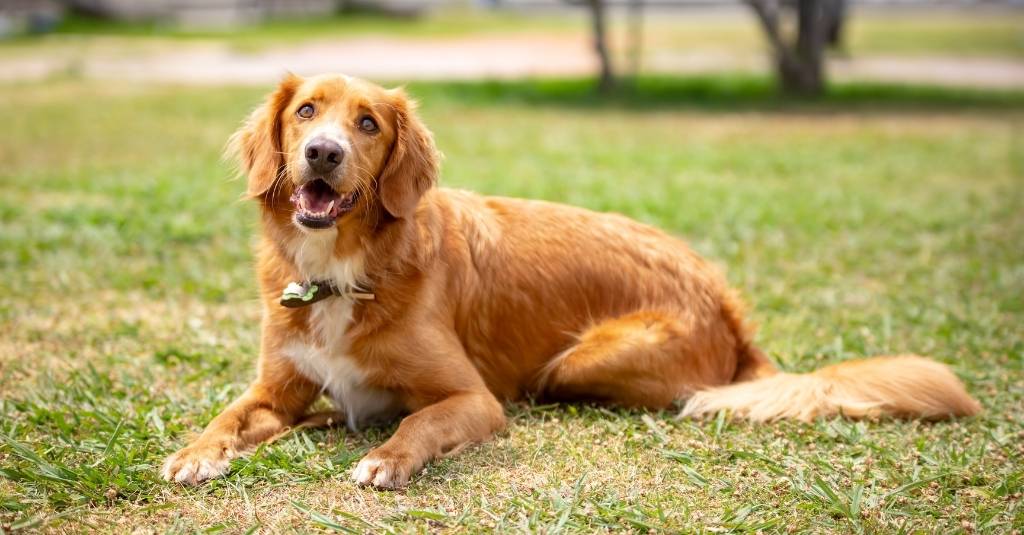
It’s not uncommon to notice or feel small lumps and bumps on our beloved animals. We understand that it is scary to find these, and although not all lumps and bumps are necessarily bad, we strongly feel that a veterinarian should check them out, in order to catch any potential problems as early as possible.
Keep a log when you first notice the lump or bump and take this information with you to the vet as a reference.
Your veterinarian may ask you how long you’ve noticed the lump or bump on your pet if the lump or bump has changed and if your pet is exhibiting any unusual behavior. Keep a log when you first notice the lump or bump and take this information with you to the veterinarian as a reference. Your veterinarian will also likely want to perform cytology (using a needle to aspirate the lump), or a biopsy (which is when a piece of the lump is sent to a pathologist to examine and determine what it is).
Benign lumps are generally fatty lumps (often referred to as lipoma), warts and cysts. Generally, lipomas do not need to be removed. However even a benign lipoma may cause your dog or cat discomfort, and you may want to discuss removing it with your veterinarian. Benign lumps and bumps should still be monitored, as things can change.
As we mentioned, a veterinarian should examine all lumps and bumps. The following, however, should be checked out as quickly as possible as these are abnormal and maybe a particular cause for concern:
Your cat or dog’s lump may be granulomas, abscesses, tumors, or cysts. If it’s a tumor, it could be benign or malignant—there is just no way to know until cytology or a biopsy is done.
Unfortunately, more than half of dogs over the age of 10 are likely to develop cancer in their lifetime. Cancerous tumors are masses of tissue that result when cells divide more rapidly than normal or do not die when they should.
Young dogs can also have malignant tumors. we’ve had our own pet cancer scare with our dog Louie when he was just 1 year of age. He had a fibrosarcoma (a cancerous tumor) between his shoulder blades in the skin. Most treatment plans for canine tumors involve surgical removal of the tumor. Depending on the tumor type and location, your veterinarian may recommend adding other treatments such as chemotherapy. You may also want to discuss using natural supplements like NHV ES Clear, Milk Thistle, PetOmega 3, BK Detox, and Turmeric in conjunction with other cancer treatments to help support the body and immune system.
An update on our dog Louie: His tumor was removed with wide margins (which is the area around the tumor) and it has not returned since. He is 9 now!
If you have any questions about a lump or bump on your dog or cat and would like a second opinion, or a comprehensive holistic plan for your pet, please book an online consultation with us.
liver support

Support for liver and kidney detox and cancer support in dogs
3 month supply for a small to medium size pet
These effects help to remove chemicals and toxins that can accumulate in your dog’s system. It is one of the few herbs with no equivalent in conventional medicine.


These effects help to remove chemicals and toxins that can accumulate in your dog’s system. It is one of the few herbs with no equivalent in conventional medicine.

Milk Thistle is a powerful herb that’s been used by humans for thousands of years. The active ingredient, silymarin, has been shown through scientific studies to possess strong anti-inflammatory, antioxidant, and detoxifying properties. It also promotes cellular regeneration and repair.
This supplement by NHV Natural Pet Products uses 100% natural milk thistle to support dogs through liver and kidney conditions in addition to conventional treatment by their veterinarian.
Milk thistle improves kidney function due to the damage from:
The extraordinary antioxidant properties of milk thistle for dog extract acts to:
The scientific name for milk thistle is Silybum Marianum. It’s also referred to as wild artichoke and holy thistle.
Milk thistle for dog liver support can be used in conjunction with conventional treatments and is glycerin based and safe for long-term use. You can read more about the benefits of using milk thistle on Dr. Hillary Cook’s blog.
At NHV, all of our products including milk thistle for dog kidney support are plant-based and make excellent proactive support for many health conditions. If you have questions on milk thistle for dogs or any of our holistic supplements, you can ask an expert at NHV because we put your pet first when it comes to health and healing naturally.
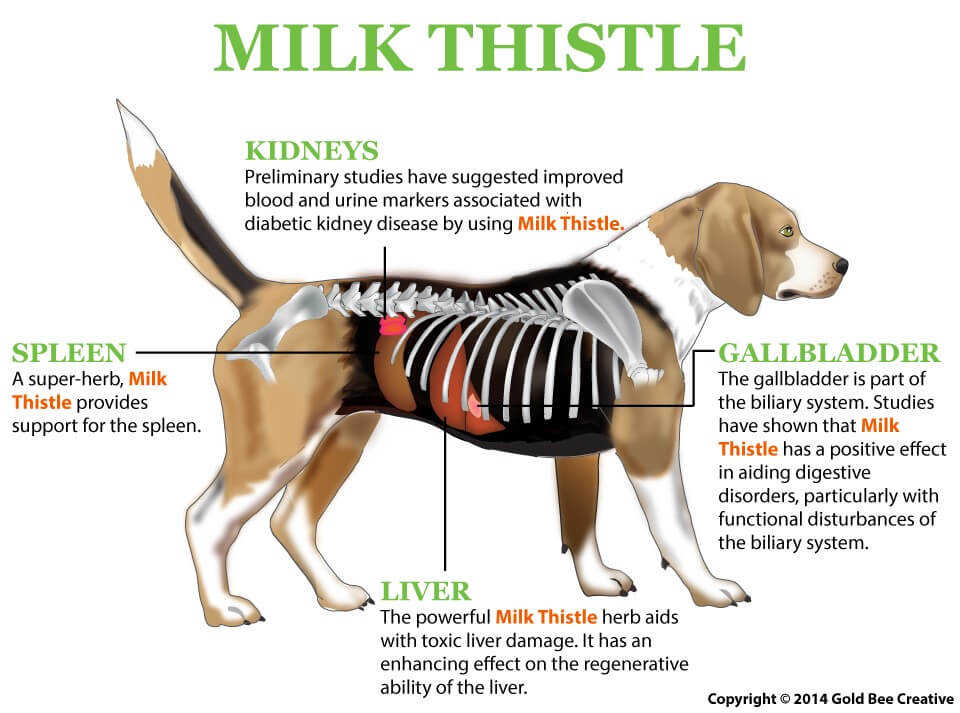
Select your pet's weight to determine the correct dose.
To be taken twice daily. Determine your pet’s weight and then use the easy chart below to determine the correct dose. This is the minimum dosage.
Pet's Weight Dosage
0 - 15 lb = 0.5 ml
16 - 30 lb = 1.0 ml
31 - 45 lb = 1.5 ml
46 - 60 lb = 2.0 ml
61 - 75 lb = 2.5 ml
Over 75 lb = 3.0 ml
How to Administer
Shake well before use. The easiest method is to use the dropper provide and places the drops into your pet’s food or favorite treat. You can also use the dropper and squirt directly into the pet’s mouth.
Some pets can be finicky, if this occurs consider hiding the drops in foods most pet’s love such as fish, chicken or yogurt or a favourite treat. If your pet only eats dry food then soak a few kibbles at feeding time.
For Best Results
Herbal dietary supplements are beneficial to the health and wellbeing of your pet and are safe for long-term use. Every pet responds to natural herbal supplements differently, therefore it is important to be consistent and administer the product daily. Supplements generally take two to four weeks to take effect, however this will vary from one animal to the next.
Product Storage
All NHV Natural Pet Products are pure herbal extracts and contain no artificial additives, preservatives or coloring. Shelf life after opening is 6 months and must be refrigerated after opening.
Cautions and Contraindications
Do not use Milk Thistle in pregnant or nursing animals. Speak to your vet before using our products. A second visit is recommended if your pet’s condition does not improve, or deteriorates after continued use of the supplements.
All information provided by NHV Natural Pet Products is for educational purposes only.
Milk Thistle is a powerful herb that’s been used by humans for thousands of years. The active ingredient, silymarin, has been shown through scientific studies to possess strong anti-inflammatory, antioxidant, and detoxifying properties. It also promotes cellular regeneration and repair.
This supplement by NHV Natural Pet Products uses 100% natural milk thistle to support dogs through liver and kidney conditions in addition to conventional treatment by their veterinarian.
Milk thistle improves kidney function due to the damage from:
The extraordinary antioxidant properties of milk thistle for dog extract acts to:
The scientific name for milk thistle is Silybum Marianum. It’s also referred to as wild artichoke and holy thistle.
Milk thistle for dog liver support can be used in conjunction with conventional treatments and is glycerin based and safe for long-term use. You can read more about the benefits of using milk thistle on Dr. Hillary Cook’s blog.
At NHV, all of our products including milk thistle for dog kidney support are plant-based and make excellent proactive support for many health conditions. If you have questions on milk thistle for dogs or any of our holistic supplements, you can ask an expert at NHV because we put your pet first when it comes to health and healing naturally.

Select your pet's weight to determine the correct dose.
To be taken twice daily. Determine your pet’s weight and then use the easy chart below to determine the correct dose. This is the minimum dosage.
Pet's Weight Dosage
0 - 15 lb = 0.5 ml
16 - 30 lb = 1.0 ml
31 - 45 lb = 1.5 ml
46 - 60 lb = 2.0 ml
61 - 75 lb = 2.5 ml
Over 75 lb = 3.0 ml
How to Administer
Shake well before use. The easiest method is to use the dropper provide and places the drops into your pet’s food or favorite treat. You can also use the dropper and squirt directly into the pet’s mouth.
Some pets can be finicky, if this occurs consider hiding the drops in foods most pet’s love such as fish, chicken or yogurt or a favourite treat. If your pet only eats dry food then soak a few kibbles at feeding time.
For Best Results
Herbal dietary supplements are beneficial to the health and wellbeing of your pet and are safe for long-term use. Every pet responds to natural herbal supplements differently, therefore it is important to be consistent and administer the product daily. Supplements generally take two to four weeks to take effect, however this will vary from one animal to the next.
Product Storage
All NHV Natural Pet Products are pure herbal extracts and contain no artificial additives, preservatives or coloring. Shelf life after opening is 6 months and must be refrigerated after opening.
Cautions and Contraindications
Do not use Milk Thistle in pregnant or nursing animals. Speak to your vet before using our products. A second visit is recommended if your pet’s condition does not improve, or deteriorates after continued use of the supplements.
All information provided by NHV Natural Pet Products is for educational purposes only.
overall vitality
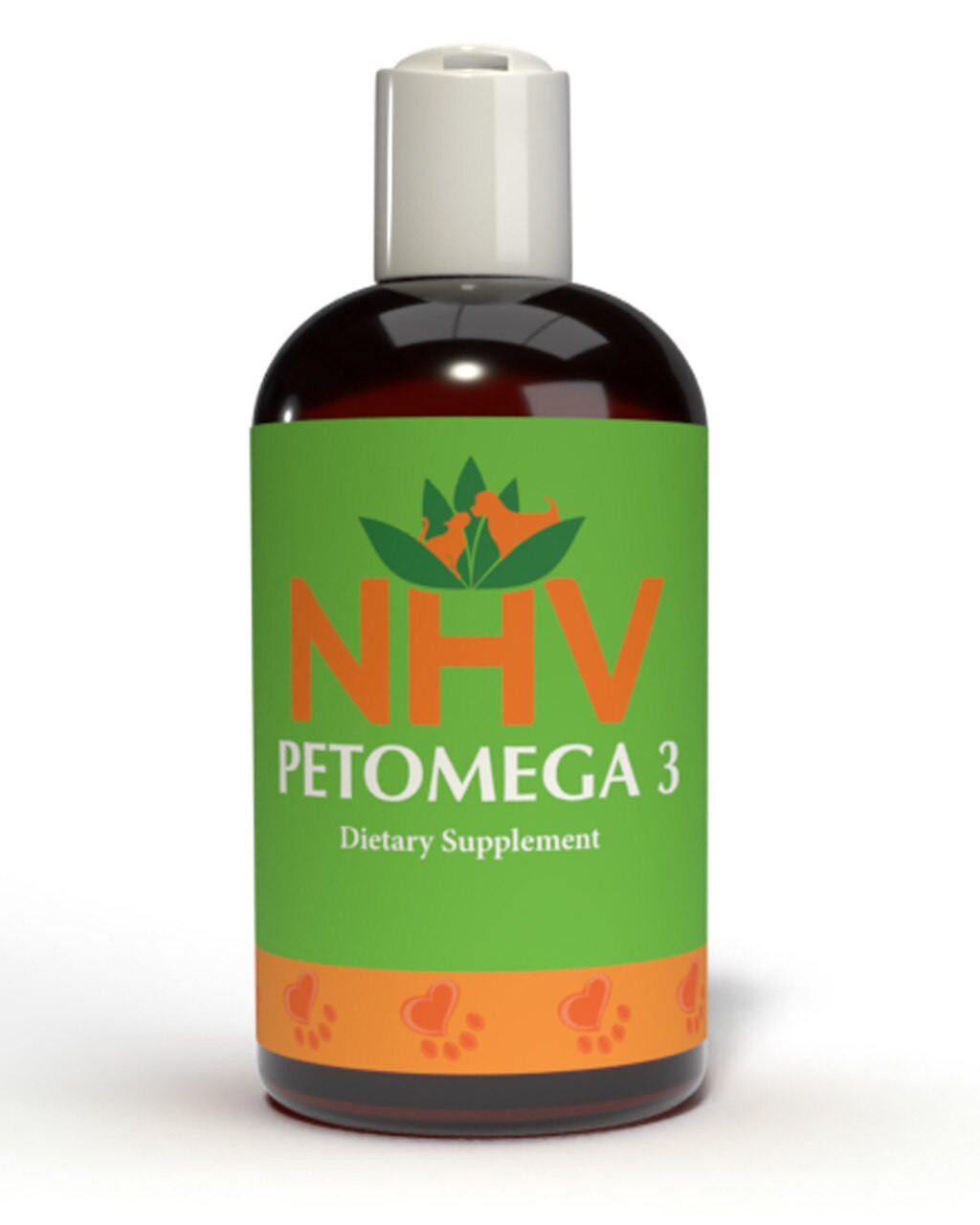
For Overall Health and Well-Being
buy 2 and save $3
Support your dog’s health with omega 3 fish oil for dogs. Help them maintain a healthy coat, eyes, joints, immune system and overall organ function.


Support your dog’s health with omega 3 fish oil for dogs. Help them maintain a healthy coat, eyes, joints, immune system and overall organ function.

Our omega 3 fish oil for dogs is a great source of EPA (Eicosapentaenoic Acid 600mg) and DHA (Docosahexaenoic acid 460mg) essential fatty acids. This fish oil supplement for dogs is derived from sardines, anchovies and North Atlantic cod liver oil. It is molecularly distilled and cold pressed to improve the bioavailability of the omega 3 fatty acids, and is medical and human grade quality.
Omega 3 fish oil for dogs may be beneficial for the following:
Processed pet foods have increased omega-6 fatty acids, and decreased omega-3 fatty acids. The University of Maryland Medical Center states, "It is very important to maintain a balance between omega-3 and omega-6 fatty acids in the diet. A proper balance helps maintain and even improve health." Your dog’s body cannot easily make essential fatty acids. It is vital to provide omega 3 fish oil for dogs as an added supplement to your pet’s daily diet.
The American Journal of Veterinary Medicine has published studies on the benefits of omega 3 fatty acids (fish oils) for arthritis and degenerative joint disease in dogs. The studies showed that dogs who were given omega 3 fatty acids had a significantly improved ability to get up from a resting position and marked improvement in walking ability.
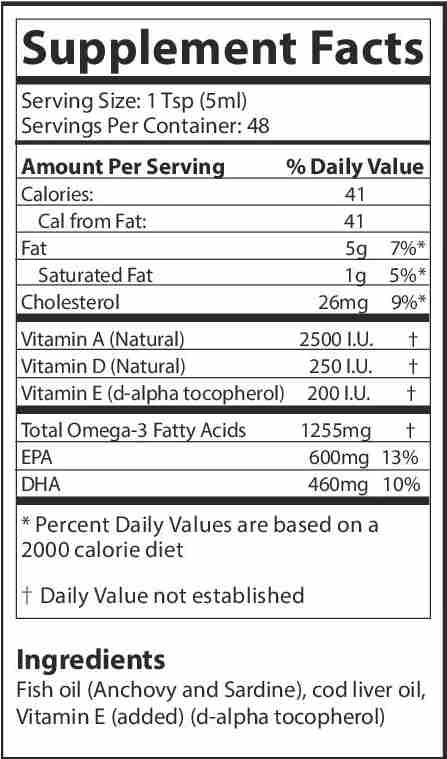
Suggested Dosage: To be taken once per day. Add to food based on weight chart.
Therapeutic Dosage: Double the quantity for maximum period of 4 weeks or follow veterinarian advise.
Pet’s Weight Dosage
0-15 lb = ¼ tsp
15-30 lb = ½ tsp
30-60 lb = 1 tsp
60-90 lb = 1 ½ tsp
How to Administer: Shake well before use. The easiest method is to add the dosage to your pets food. Some pets can be finicky, if this occurs consider hiding the appropriate amount in food most pet’s love such as fish, chicken, yogurt, or a favorite treat. If your pet only eats dry food then soak kibbles at feeding time.
For Best Results
Dietary supplements are beneficial to the health and well-being of your pet and are safe for long-term use. Every pet responds to natural supplements differently, therefore it is important to be consistent and administer the product daily. Supplements generally take two to four weeks to take effect, however this will vary from one animal to the next.
Product Storage
All NHV Natural Pet Products contain no artificial additives, preservatives or coloring. Shelf life after opening is 6 months and must be refrigerated after opening.
Cautions and Contraindications
Avoid During Pregnancy.
Our omega 3 fish oil for dogs is a great source of EPA (Eicosapentaenoic Acid 600mg) and DHA (Docosahexaenoic acid 460mg) essential fatty acids. This fish oil supplement for dogs is derived from sardines, anchovies and North Atlantic cod liver oil. It is molecularly distilled and cold pressed to improve the bioavailability of the omega 3 fatty acids, and is medical and human grade quality.
Omega 3 fish oil for dogs may be beneficial for the following:
Processed pet foods have increased omega-6 fatty acids, and decreased omega-3 fatty acids. The University of Maryland Medical Center states, "It is very important to maintain a balance between omega-3 and omega-6 fatty acids in the diet. A proper balance helps maintain and even improve health." Your dog’s body cannot easily make essential fatty acids. It is vital to provide omega 3 fish oil for dogs as an added supplement to your pet’s daily diet.
The American Journal of Veterinary Medicine has published studies on the benefits of omega 3 fatty acids (fish oils) for arthritis and degenerative joint disease in dogs. The studies showed that dogs who were given omega 3 fatty acids had a significantly improved ability to get up from a resting position and marked improvement in walking ability.

Suggested Dosage: To be taken once per day. Add to food based on weight chart.
Therapeutic Dosage: Double the quantity for maximum period of 4 weeks or follow veterinarian advise.
Pet’s Weight Dosage
0-15 lb = ¼ tsp
15-30 lb = ½ tsp
30-60 lb = 1 tsp
60-90 lb = 1 ½ tsp
How to Administer: Shake well before use. The easiest method is to add the dosage to your pets food. Some pets can be finicky, if this occurs consider hiding the appropriate amount in food most pet’s love such as fish, chicken, yogurt, or a favorite treat. If your pet only eats dry food then soak kibbles at feeding time.
For Best Results
Dietary supplements are beneficial to the health and well-being of your pet and are safe for long-term use. Every pet responds to natural supplements differently, therefore it is important to be consistent and administer the product daily. Supplements generally take two to four weeks to take effect, however this will vary from one animal to the next.
Product Storage
All NHV Natural Pet Products contain no artificial additives, preservatives or coloring. Shelf life after opening is 6 months and must be refrigerated after opening.
Cautions and Contraindications
Avoid During Pregnancy.
immune support
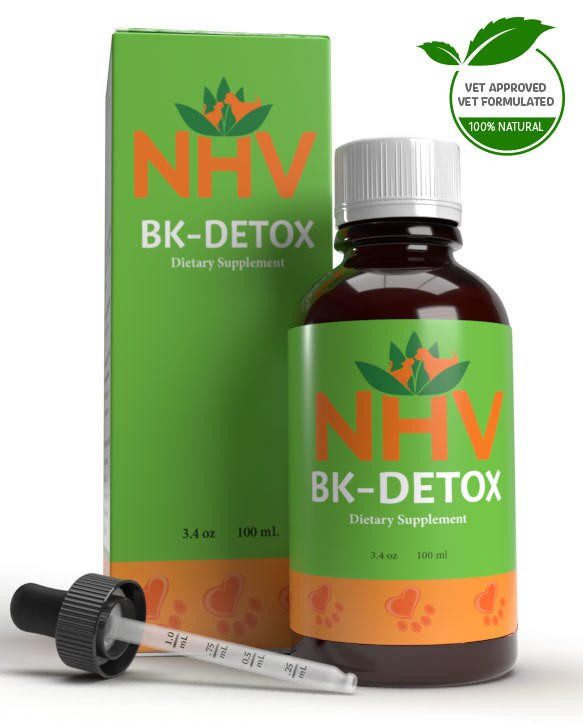
Detoxifies the Blood and Organs, Boosts (support) the Immune System
buy 2 and save $3
3 month supply for a small to medium size pet.
A dog immune support supplement that helps with compromised immune systems that may be fighting cancer, skin problems or heartworms.

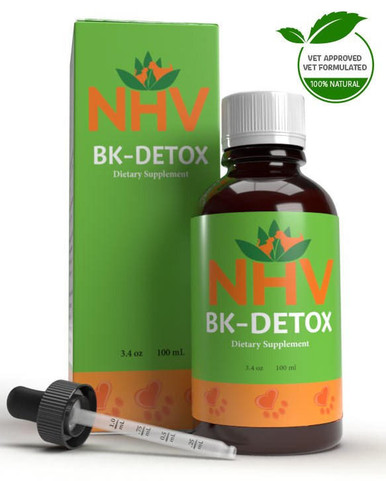
A dog immune support supplement that helps with compromised immune systems that may be fighting cancer, skin problems or heartworms.

Dogs live in a world full of pollutants that they breathe, ingest, and play in every day. Protect them with BK Detox, an all-natural dog immune system (support) booster and detoxifier specially formulated to restore balance, regulate the immune system, and help your pet live a healthier, happier life.
What many people think of as boosting the immune system is actually balancing the immune system. A balanced immune response is the healthiest for helping your pet’s body detect and respond to toxins and infections.
Your dog’s body filters blood impurities through the liver and other vital organs of a dog’s body and then supplies nutrients and oxygen to the cells and tissue, which plays an important role in keeping your dog healthy. BK Detox dog immune system support and detoxifier will help flush toxins out of your pet’s blood and vital organs. When the immune system is compromised, toxins can accumulate in your dog and cause problems including liver disorders, urinary tract infections, skin allergies, tumors, bad breath, and respiratory issues.
Red Clover – A blood-purifying herb with antibiotic and anti-inflammatory properties. It promotes cleansing and the elimination of toxins and deposits through diuretic and expectorant activity.
Cleavers – A tonic that increases the circulation of lymph-impaired areas of the body and aids in the drainage of lymph-engorged cysts, tumors, and inflamed tissues of the urinary tract.
Neem – Has powerful blood purifying and detoxifying effects.
Oregon Grape – Supports and improves digestion by helping rid the body of waste and toxins in the blood.
Gotu Kola – Known for its cleansing, diuretic, and strong antioxidant properties.
Buckthorn – A gentle laxative and blood-cleansing tonic.
Burdock – A highly effective blood purifier abundant in calcium, phosphorus, iron, thiamine, and riboflavin. Supports the entire body while gently eliminating toxic build-up.
Sarsaparilla – A cleansing herb that stimulates the kidneys to flush deposits and clear toxins.
Echinacea Angustifolia – Boosts a dog’s immune system and stimulates the body’s defense mechanism.
Chaparral – A blood purifying antioxidant-rich in amino acids.
Prickly Ash – A tonic that stimulates the entire lymphatic system to encourage the elimination of toxic metabolites.
Select your pet's weight to determine the correct dose.
Bk Detox can be used as a detoxifier every 6 months. For best results administer the recommended dosage until the bottle is finished.
To be taken twice daily. Determine your pet’s weight and then use the easy chart below to determine the correct dose. This is the minimum dosage.
Pet's Weight Dosage
0 - 15 lb = 0.5 ml
16 - 30 lb = 1.0 ml
31 - 45 lb = 1.5 ml
46 - 60 lb = 2.0 ml
61 - 75 lb = 2.5 ml
Over 75 lb = 3.0 ml
For small animals (rabbits, ferrets), avians and reptiles use 1 drop for every 2 lb of body weight.
How to Administer: Shake well before use. The easiest method is to use the dropper provided and place the drops into your pet’s food or favorite treat. You can also use the dropper and squirt directly into the pet’s mouth. Some pets can be finicky, if this occurs consider hiding the drops in foods most pet’s love such as fish, chicken, yogurt, or a favorite treat. If your pet only eats dry food then soak a few kibbles at feeding time.
For Best Results
Herbal dietary supplements are beneficial to the health and well-being of your pet and are safe for long-term use. Every pet responds to natural herbal supplements differently, therefore it is important to be consistent and administer the product daily. Supplements generally take two to four weeks to take effect, however this will vary from one animal to the next.
Product Storage
All NHV Natural Pet Products are pure herbal extracts and contain no artificial additives, preservatives, or coloring. Shelf life after opening is 6 months and must be refrigerated after opening.
Cautions and Contraindications
Do not use BK Detox in pregnant or nursing animals.
Speak to your vet before using our products. A second visit is recommended if your pet’s condition does not improve, or deteriorates after continued use of the supplements.
All information provided by NHV Natural Pet Products is for educational purposes only.
Dogs live in a world full of pollutants that they breathe, ingest, and play in every day. Protect them with BK Detox, an all-natural dog immune system (support) booster and detoxifier specially formulated to restore balance, regulate the immune system, and help your pet live a healthier, happier life.
What many people think of as boosting the immune system is actually balancing the immune system. A balanced immune response is the healthiest for helping your pet’s body detect and respond to toxins and infections.
Your dog’s body filters blood impurities through the liver and other vital organs of a dog’s body and then supplies nutrients and oxygen to the cells and tissue, which plays an important role in keeping your dog healthy. BK Detox dog immune system support and detoxifier will help flush toxins out of your pet’s blood and vital organs. When the immune system is compromised, toxins can accumulate in your dog and cause problems including liver disorders, urinary tract infections, skin allergies, tumors, bad breath, and respiratory issues.
Red Clover – A blood-purifying herb with antibiotic and anti-inflammatory properties. It promotes cleansing and the elimination of toxins and deposits through diuretic and expectorant activity.
Cleavers – A tonic that increases the circulation of lymph-impaired areas of the body and aids in the drainage of lymph-engorged cysts, tumors, and inflamed tissues of the urinary tract.
Neem – Has powerful blood purifying and detoxifying effects.
Oregon Grape – Supports and improves digestion by helping rid the body of waste and toxins in the blood.
Gotu Kola – Known for its cleansing, diuretic, and strong antioxidant properties.
Buckthorn – A gentle laxative and blood-cleansing tonic.
Burdock – A highly effective blood purifier abundant in calcium, phosphorus, iron, thiamine, and riboflavin. Supports the entire body while gently eliminating toxic build-up.
Sarsaparilla – A cleansing herb that stimulates the kidneys to flush deposits and clear toxins.
Echinacea Angustifolia – Boosts a dog’s immune system and stimulates the body’s defense mechanism.
Chaparral – A blood purifying antioxidant-rich in amino acids.
Prickly Ash – A tonic that stimulates the entire lymphatic system to encourage the elimination of toxic metabolites.
Select your pet's weight to determine the correct dose.
Bk Detox can be used as a detoxifier every 6 months. For best results administer the recommended dosage until the bottle is finished.
To be taken twice daily. Determine your pet’s weight and then use the easy chart below to determine the correct dose. This is the minimum dosage.
Pet's Weight Dosage
0 - 15 lb = 0.5 ml
16 - 30 lb = 1.0 ml
31 - 45 lb = 1.5 ml
46 - 60 lb = 2.0 ml
61 - 75 lb = 2.5 ml
Over 75 lb = 3.0 ml
For small animals (rabbits, ferrets), avians and reptiles use 1 drop for every 2 lb of body weight.
How to Administer: Shake well before use. The easiest method is to use the dropper provided and place the drops into your pet’s food or favorite treat. You can also use the dropper and squirt directly into the pet’s mouth. Some pets can be finicky, if this occurs consider hiding the drops in foods most pet’s love such as fish, chicken, yogurt, or a favorite treat. If your pet only eats dry food then soak a few kibbles at feeding time.
For Best Results
Herbal dietary supplements are beneficial to the health and well-being of your pet and are safe for long-term use. Every pet responds to natural herbal supplements differently, therefore it is important to be consistent and administer the product daily. Supplements generally take two to four weeks to take effect, however this will vary from one animal to the next.
Product Storage
All NHV Natural Pet Products are pure herbal extracts and contain no artificial additives, preservatives, or coloring. Shelf life after opening is 6 months and must be refrigerated after opening.
Cautions and Contraindications
Do not use BK Detox in pregnant or nursing animals.
Speak to your vet before using our products. A second visit is recommended if your pet’s condition does not improve, or deteriorates after continued use of the supplements.
All information provided by NHV Natural Pet Products is for educational purposes only.
Published: March 24, 2017
2 replies
My lab has a peripheral myelin sheath tumor, it has been removed twice. However, due to the location they are not able to remove it all so it regrows. What supplements do you recommend?
Hi Amanda,
Thank you so much for reaching out to us.
Your sweet lab is so lucky to have you to look after them. We’re so grateful for you for being there for your sweetheart when they needed you most. You’re doing amazing furmama!
We have a few suggestions for you that we think could help to keep your little one as comfortable as possible:
First, we’d recommend ES-Clear. This all-natural supplement is our main support for pets with cancer. The herbs in this blend can help to promote detoxification, improve quality of life, and can help to balance a compromised immune system.
Here’s more information on ES-Clear for you: https://www.nhvnaturalpetproducts.com/es-clear-for-dog-cancer
Additionally, we would recommend Natures Immuno. This is our medicinal mushroom blend that can help support dogs with cancer. Natures Immuno can help to support heart and cardiovascular health, fight off chronic viral infections, and can help to balance the immune system.
More information on Natures Immuno for you: https://www.nhvnaturalpetproducts.com/natures-immuno-medicinal-mushroom-blend-dogs
We hope this helps! Please feel free to reach out to us if you have any questions or need any help at all. We’re always here to help!
Sending you and your little one lots of love!
Yours in wellness,
Team NHV